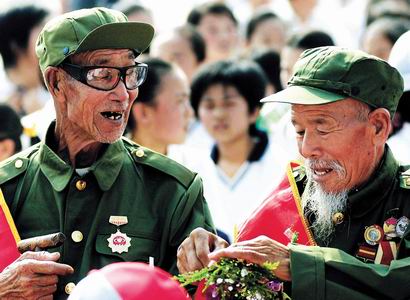Shanghai Daily/Xinhua

Two war veterans share a light moment at a ceremony held
in Shanxi Province yesterday to mark the 60th anniversary of Japan's
surrender. The province was a major base for the Chinese Communist
army fighting the Japanese aggressors.-Xinhua
When Shanghai farmer Ye Lingen learned that Japan had surrendered 60 years
ago, he rushed to his family's graves.
His mother had died in a Japanese
bombing attack on the city. His father and brother were bayoneted to death by
Japanese soldiers, and his grandmother died in prison after she was forced to
eat human flesh.
On that day long ago, Ye cried that their deaths had been
avenged.
Now 80, Ye returned to the family graves yesterday as he's done on
every August 15 since 1945, the day World War II ended in the Pacific.
The
war years are still fresh in his memory, and during every annual grave-side
visit he prays for lasting peace.
Ye's family was among the more than 20
million Chinese who lost their lives in what the country calls the War of
Resistance Against Japanese Aggression.
Most cities across the nation marked
the event with remembrance ceremonies and special exhibitions depicting hardship
and heroism.
In Shanghai, thousands of people - from students to government
officials - honored the day with a look back at history.
Among the events, an
exhibition entitled "Eternal Memory" opened to the public yesterday at the
Shanghai Art Museum.
It features 200 works depicting the war's suffering and
its heroes and will run through August 23.
At another event, Wang Xuan,
representing victims of Japan's chemical warfare units, delivered a lecture on a
lawsuit seeking compensation from the Japanese government.
During his talk,
Wang declared that Chinese people must not forget the Japanese invasion.
"The
litigation is not only a war compensation issue but also historical education,"
he said.
Also yesterday, 11 city residents who were captured by the Japanese
received a special gift: a book called "Painful Experiences of Forced Labor."
The book's formal launch will be hosted by the Shanghai Sanlian Bookstore
this weekend.
To compile the edition, attorneys from the Shanghai Tianhong
Law Firm and students at East China Normal University collected stories from 28
city residents who were forced into slave labor by the Japanese
invaders.
"The book is designed as a record for further lawsuits," said
Tianhong's Zhu Miaochun, the edition's chief editor.
The law firm is
representing some of the plaintiffs in legal action against the Japanese
government.
Qi Zugan, 86, who was carried off to a coal mine in Fukuoka,
Japan, in 1944 and returned to China in 1945, said the book is a record of the
hardships faced by the slave laborers and a textbook for younger
generations.
"I will never give up the fight for compensation and an apology
from the Japanese mining company," said Qi, who went to Japan last year for a
hearing on a 15 million yen (US$133,500) lawsuit he filed with four other
laborers. "Another plaintiff will fly to Japan later this year for the
case."
Shanghai explorer Wang Longxiang marked the day in his own way. He
finished a four-month adventure by motorcycle covering 20 provinces and
autonomous regions and more than 260 major battlefields and historic spots
related to the fighting.
Also yesterday, The Radio Shanghai and Shanghai
Archives held a symposium in which it called on audience members to "remember
the past and look forward to the future."
Lan Ying, an 80-year-old former
soldier, was among those attending. "I grew up during the war and I will never
forget it," Lan said.
"Youngsters should never forget the Japanese atrocities
and the hardships their ancestors experienced," he said.
In Beijing, more
than 3,000 Buddhists gathered to burn joss sticks and prayer for world
peace.
Following their prayers, Buddhists from the Chinese mainland, Hong
Kong, Macau and Taiwan held a memorial ceremony for the Chinese soldiers and
civilians killed in the war.
"We are sincerely praying for the reunification
of Taiwan with the motherland and the prosperity of the Chinese nation," said
one of the representatives. "We pray for the replacement of wars with peace, and
a world in which people may live happy lives."



